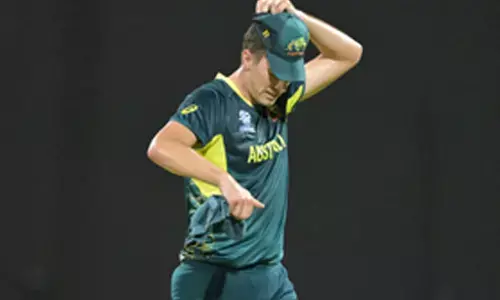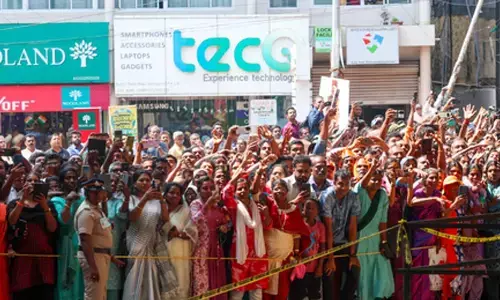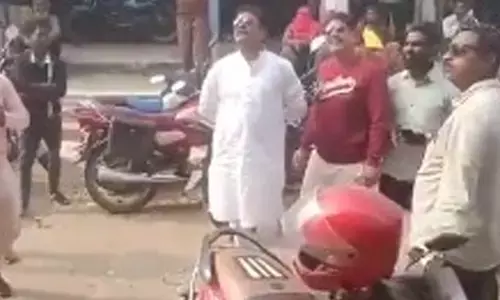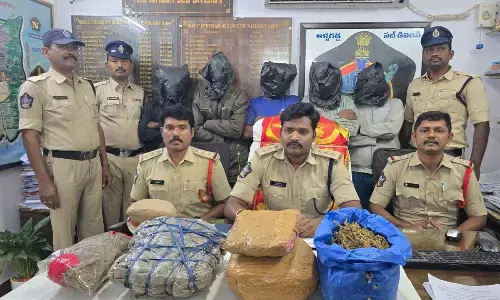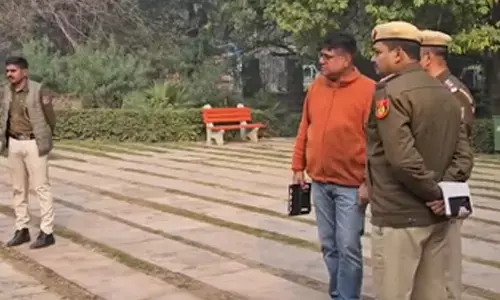MyVoice: Views of our readers 20th October 2024

MyVoice: Views of our readers 19th January 2026
It is not a big deal to hold a miniature Constitution in hand while taking the oath as MP as Rahul Gandhi and other secular apologists had done in the Parliament to hoodwink the nation on their long-term notions to revamp ideals of secularism that proved a miserable naught.
Minority appeasement is not secular politics
Sub: Bold Talk by V Ramu Sarma – Bitten by pseudo secular bug (October 19, 2024). The Congress forgot the credo that ‘Secularism’ is meant for all; and not restricted to pandering to one community. This tendency on part of the INDIA group is the sad and unmissable reality in the country. The Congress, along with others is maintaining a stoic silence on the Waqf Board issue that gives muscle to Asaduddin Owaisi’s AIMIM extending support to Congress in Maharashtra elections.
The Supreme Court upholding the validity of Section 6A of Citizenship Act in Assam is creating ripples in Congress on what other future things that are in the offing at a time when it is doggedly pro-Muslim, without showing any shame. The Opposition members on the JPC panel deliberating Waqf Amendment Act are deliberately on the back foot with a view to delaying the issue that is very essential for the country before the hydra-like hands of the Waqf systematically usurp every part of the country – not even sparing centuries old temples and historic Hindu monuments.
–S Lakshmi, Hyderabad
***
It is not a big deal to hold a miniature Constitution in hand while taking the oath as MP as Rahul Gandhi and other secular apologists had done in the Parliament to hoodwink the nation on their long-term notions to revamp ideals of secularism that proved a miserable naught. Their allegations of atrocities against women and dalits in the BJP ruled states are so disgusting and sickening that the electorate of the country have vividly understood their game plan and wicked motive. To top it all, overconfidence seems to be the bane of the Congress as it happened in Haryana that miserably backfired, resulting in an impressive victory of BJP despite a great deal of lies and disinformation propagated by the Congress. The strong spirit of the Constitution is well understood by the people despite designs by the Opposition to use it akin to a handmaid, the consequences of which will reverberate in the elections in the face of the irresponsible INDI Alliance.
– K V Raghuram, Wayanad
***
The poll verdict in Haryana is a slap in the face of Congress that reinforces the fact about its abject failure to address core issues that resonate with the voters by harping on appeasement politics. As failures and half-hearted measures were accentuated by Congress in the absence of guiding principles and controlling mechanism to redress inequality, the party has only gained a notoriety by living up to the legacy of "Divide and Rule" since the dawn of independence, with the result that it moved ahead focusing its energy by indulging in appeasement politics to the detriment of the majority. It thus failed to understand that in a politically polarised system when it is just not possible to reconcile extremely hostile positions, it is a pity that still Congress relies on Gandhi family and minority politics to change its fortunes.
Also, Congress party's reluctance to speak out on Waqf Amendment bill when certain Muslim organisations made absurd claims on a few important places and lands as Waqf properties with no substantial proof goes to show its failure to uphold justice and abhorrence to the values.
– K R Srinivasan, Secunderabad-
THE VOICE OF BANJARA COMMUNITY
Miffed when parents pulled him up for spending lots of money on buying books and for not focusing on his diploma studies, young Ramesh Karthik Naik decided to commit suicide and even slept on the Railway tracks! When the train was speeding towards him, he changed his mind and rolled off the tracks at the last minute.
Years later he went on to become the first ever Banjara author and he has won the Sayithya Akademi Yuva Puraskar (Telugu) this year for his collection of short stories titled,"Dhaavlo" (A Song of Lament) published by Anvikshki Publishers, Hyderabad. Born at a remote thanda of a small mandal in Nizamabad district, this 26-year-old author has now three collections of short stories in Telugu and one collection of poems in English to his credit. At present, Naik is doing a diploma in Spanish in EFLU.
In 1960s and early 70s Lambadi men and women used to bring donkey loads of firewood early in the morning to sell in our home town of Anantapur. While my father often was bargaining with them, as a teenager I was fascinated by the hair style of these thanda women, their red and loose garments studded with twinkling mirrors and more so by the strange sounds in their language and by the ease with which these women shepherded their donkeys and sold their ware. Though I wanted to know the meanings of their words, few people around me had any knowledge about their vocabulary. This book has fulfilled my quest, after so many years though.
The eight stories in the prize-winning anthology take me down the memory lane when Ramesh paints vivid pictures of Banjara people and their life in all its hues and shades. Since the author uses the language of his people, often in its natural crude idiom, I have known now many terms associated with their sartorial culture and quotidian rituals. The glossary of word meanings given as footnotes in each page simply erases the language barriers and amply services the author's sole purpose of telling the society that "We (Banjara tribal people)are still alive".
As a literary critic says, by bringing out this 'Adivasi Literature', Ramesh Naik has become the 'Voice of the Voiceless'. Yes, this young and promising author knows very well the art of telling stories and stunning the reader with his original thoughts and poetic ways of wielding words-
As actor and author Tanikella Bharani says that, 'these stories hold a mirror to the unknown and untold lives of Adivasi people', read them for the sheer joy of entering and exploring the wonderful world of Banjara Community.
–M Somasekhar Prasad, Hyderabad
Congress must wake up to bitter reality
It is a known fact that Congress leaders who believed that their party has a right to power took the people and the cadre for granted, fought among themselves and delivered Haryana on a patter to their archrivals. It can now either recognise the reality that it is fighting a 24-by-7 opponent with endless resources and shape up the alliance or continue with the games of one-upmanship that it likes to play.
The grand old party will also do well to realise that it is a junior partner in the alliance in most constituencies that go to polls now. The Election Commission of India has scheduled the voting in a single phase in Maharashtra and in two phases in Jharkhand. It may be noted that the panel held the Lok Sabha elections in Maharashtra in five phases and in Jharkhand in four phases. The Opposition parties had then questioned the logic of spreading elections over so wide a time frame. The poll panel must put in place some mechanism to assure that election schedules follow a logical pattern.
Political observers feel that while it may be tempting to draw parallels between Hayana and Maharashtra, caste dynamics and agrarian sedly involving the dominant community differ in both stains. Moreover, in Maharashtra, the focus will be on the state's progressive identity legacy of social justice polities, shifting political dynamics and declining social indicators. Political stability will be an important factor in the election.
Doubtless, all political parties, big or small, are entitled to seek power through the ballot box, but nonetheless the onus lies with the voters to ensure that there is a modicum of honesty in that pursuit. .
Other issues such as the expansion of caste quotas, unemployment, regional disparities, law and order, etc., are bound to resonate with the voters.
–Yash Pal Ralhan, Jalandhar
A case for jamili elections in India
This October marks the completion of 73 years since the first general elections were held in India. For the first time voting was done in Himachal Pradesh on 25 October 1951. Until 21 February 1952 elections were held in 68 phases all across the country. In the new Independent India, this was an amazing experiment. That was the time when uneducated voters participated in the poll process despite not knowing how to vote nor did they know the value of the vote. The British rulers had ridiculed India's elections and democracy and considered Independence to India as an unnecessary privilege / exercise. The then British Premier Winston Churchill had belittled Indians and their wisdom to run the nation. India had retained the people's government despite Pakistan which became Independent at the same time and had to go under army rule.
It is a special feature to note that a debate has started with a new slogan of One Nation - One Election in 2024 which marks 73rd year of initiating election procedure in the country. This has been the process accepted by Modi's cabinet recently. While the BJP government under Modi has included Jamili elections as a part of its agenda, the opposition has declined such a move as being unconstitutional. In Independent India, the first time elections were undoubtedly the Jamili elections.
The concept of one nation- one election is likely to repeat in the nation after 73 years since the first general elections were held. All in all, the focus of attention of all political parties is drawn towards conduct of Jamili elections whereby Lok Sabha elections and elections to all state assemblies including the U/Ts would be synchronized to go at a single stretch. Huge expenditure of money as otherwise could be avoided.
–Bh Indu Sekhar, Hyderabad
Osteoporosis a major affliction in India
20th October is annually observed as the World Osteoporosis Day with an aim to highlight the condition of osteoporosis and its global burden. It is a major non-communicable, commonest disease of bones, affecting 1 in 3 women and 1 in 5 men over the age of 50 worldwide. Sadly, India witnesses the highest number of deaths because of low- bone-mass density fractures. One report says that the onset of osteoporosis cases in our country is 10 to 20 years earlier than in western countries.
Prevention is better than cure; the aim should be to take Calcium rich diet on a regular basis, absorb enough Vitamin D, do weight-bearing and strength-training exercises daily. Smoking and substance abuse should be avoided at all costs.
–Dr Sunil Chopra, Ludhiana
***
The World Osteoporosis Day, observed on October 20 by the International Osteoporosis Foundation (IOF), aims to raise awareness about bone health and the fight against osteoporosis on a global scale.
Prioritizing bone health is essential to preventing painful fractures. Early action is key, and it’s crucial for doctors and the broader community to focus on early diagnosis and proactive measures to reduce the risk of fractures.
Though osteoporosis cannot be cured, it can be effectively managed with treatments that strengthen bones. Medications such as bisphosphonates help maintain bone density by slowing bone loss. Hormonal treatments like calcitonin, SERMs (Selective estrogen receptor modulators), and estrogen therapy are particularly beneficial for postmenopausal women. However, due to potential side effects, hormone therapy is generally prescribed at the lowest dose and for the shortest duration if other medications fail. Parathyroid hormone (PTH) therapy is another option, proven to increase bone mass and benefit both men and women at high risk of fractures.
Osteoporosis is a growing health issue that demands our attention. With proper awareness, early diagnosis, and appropriate treatments, its impact can be mitigated. By taking proactive steps, we can manage bone health effectively and reduce the risk of debilitating fractures.
– Dr Krishna Kumar Vepakomma, Hyderabad
Centre must persist for Manipur peace
Apropos, "A pivotal peace process for Manipur kicks off, at least," Oct 19. The Centre-mediated talks in Delhi involving legislators from conflict-torn Manipur on didn’t yield a breakthrough but the initiative is a good beginning. Since ethnic violence broke out in Manipur in May 2023, at least 220 persons have died and over 50,000 people have been left homeless.
Violence has since become sporadic but the healing process is nowhere to be seen. In fact, the Delhi meet revealed the deep chasm that exists among communities when the Kuki MLAs declined to engage their colleagues from the Meitei community: A statement was issued on behalf of the Kuki legislators, which said that peace discussions are feasible only after a separate administration is set up for the hill districts that are
home to Kuki-Zo-Hmar communities. Interestingly, CM N Biren Singh was not invited to the legislators’ meeting in Delhi, where it appeared that the Centre intended to use the good offices of the MLAs from the Naga community to broker peace. The plan may not have worked out this time but the Centre needs to persist with talks, and perhaps, get credible civil society voices from outside Manipur to start a conversation. The polarisation is so stark that few in Manipur are willing to intervene in a scenario presumably controlled by armed groups.
–N Sadhasiva Reddy, Washington
Tread diplomacy waters carefully
Apropos "Raw official plotted to kill Sikh separatist: US (19 October). The Government of India has faltered in executing counter insurgency (or call it terrorist) in Canada. Almost all the countries (including India) have operatives whose support is taken to eliminate those who work against its integrity. India has carried out such acts in other countries which are closer to India over the last 70 years. In Canada, while dealing with separatist forces, somewhere, the operatives have left evidence and, therefore, our diplomatic channels need to handle the situation with care and wisdom.
Domestic jingoism in the upcoming election campaign would not help us in any way as Canada is not our neighbour as thousands are taking up Canadian citizenship and lakhs work or study in Canada. It is high time we in India stopped using the name ‘Khalistan’ and legitimised a place called Khalistan in the world. Whether it is India or elsewhere who demand and act for separation need to be dealt with heavy hand. These elements who are using their foreign citizenship to speak for separation need to be handled the same by any other country as the US handled Bin Laden.
–N Nagarajan, Hyderabad
***
The Canadian PM has categorically alleged the involvement of Indian agencies in the killing of Hardeep Singh Nijjar on their soil. Indian Foreign Ministry says since Trudeau has no evidence to back up, India stands vindicated. This is not a domestic crime, but an international issue, the proof submission has its own due process. Is it justified for India to write off the allegation by Canadian PM as 'cavalier' behavior?
–P R Ravinder, Hyderabad









